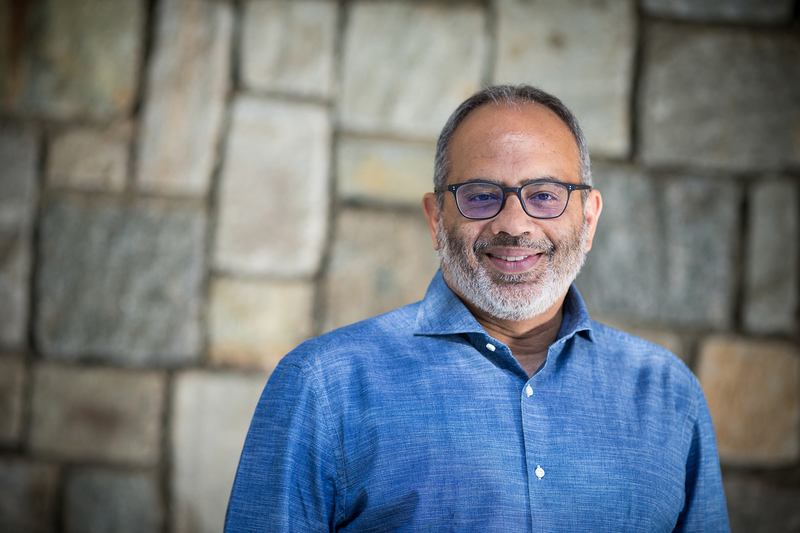The world needs a different type of ambition
30 September 2021 | Opinion Carlos Lopes. Photo Supplied. Read time >10 min.
What follows is an edited version of the keynote address presented by University of Cape Town (UCT) Honorary Professor Carlos Lopes of the Nelson Mandela School of Public Governance on the first day of the recent International Summit on SDGs in Africa 2021 hosted by UCT.
The event brought together African and global university networks and other stakeholders to mobilise collaborative efforts to accelerate African-led activities in support of achieving the SDGs and the African Union’s Agenda 2063.
We all have our favourite crises to use as excuses for poor action or to justify the lack of motivation to confront them.
There are crises of values, of pandemics, of demography, economy, energy, financial speculation, education, cultural pasteurisation of identities, the trivialisation of life, or the misery that explodes from the lack of water affecting more than a billion people.
The question is no longer which crisis seems more threatening. The real threat seems to come from an impressive convergence of critical trends, the synergy of a whole set of behaviours that are not easily understandable — because they are deeply irresponsible and often criminal — that plague our little spaceship.
In recent decades, we have almost closed the planet's statistical horizon. With all possible variations in the details, overall, we know, pretty well, what is going on. And the image that emerges is simply tragic.
Will versus action
Initially it was seen in fragments.
At the Rio 1992 Earth Summit, we expanded our vision of what was happening with the environment; in Vienna in 1993, we expanded our goals for human rights; in Cairo in 1994, the theme was how to adjust to population growth; in Beijing in 1995, the role of women in development became central; in Istanbul in 1996, we focused on how to tackle steady urbanisation; in Copenhagen, that same year, the focus became the social situation of the planet; and finally, in Johannesburg in 2002, the various pieces of puzzle came together under the banner of sustainable development; before the global players returned to Copenhagen in 2009, to scrutinise more carefully the full impact of such a new approach from the perspective of climate challenges.
This period of global conventions was a glorious moment for multilateralism. Voluntarists would remind us that we ended up with a forward-looking Millennium Development Goals (MDGs) Agenda. Sceptics would smile and refresh our memories with the assessment of dislocation of the centre of gravity of the world economy from trade into financial systems, precisely during the same period.
Today, we continue to believe that the many gatherings that have covered everything from species extinction to the acidification of the oceans, are helping us face systemic challenges.
But… is this so?
Or, were they simply arrangements in the ways we organise our will rather than our action?
The world, let us admit it, is in a crisis of development… provoked by simultaneous threats.
How can we transform the world then?
The world, let us admit it, is in a crisis of development. A crisis provoked by simultaneous threats.
The shockwaves of global economic recessions, twice in a short timespan, are increasingly affecting human development outcomes — fewer jobs and lower pay, less disposable income for healthcare and education, shrunken government spending on social services and safety nets, and, despite the rhetoric, lesser attention to environmental regeneration and ecological imperatives.
The effects of the financial systemic failures are exacerbated by the varyingly weak status of institutional capacity across the world. This is coupled with the mounting vulnerabilities fuelled by food and energy price volatility and access, climate change, growing inequality, pandemics, natural disasters, conflicts and so on.
While the causes of these diverse development challenges are numerous — and contentious at that — the fundamental call is for leadership with vision, commitment and sound public management to build resilient societies.
Having been closely involved with the design of both the MDGs and the Sustainable Development Goals (SDGs) processes, I have developed my own formulation for what we have been through. I call it the ‘cappuccino approach’.
The cappuccino approach
Sustainable development seeks to achieve social and economic progress in ways that will not exhaust the earth's natural resources. The world's resources are finite, and growth that is unmanaged and un-sustained will lead to deteriorating conditions for all.
We owe it to future generations to explore lifestyles and paths of development that effectively balance opportunities with possibilities. Therefore, creating goals are an important contribution to keeping our focus on how to attain such ambition.
When United Nations (UN) Secretary-General Ban Ki-moon established a High-Level Panel of Eminent Persons on the Post-2015 Development Agenda, three years before the end of that agenda cycle, he was looking to the road ahead. He was eager to stress the need to build on the foundations established by the Rio+20 conference so we could meet "a challenge that no country, developed or developing, has met so far."
We owe it to future generations to explore lifestyles and paths of development that effectively balance opportunities with possibilities.
The bar and expectations were set quite high. There was a recognition that sustainable development should be a process of transformative change, which required an enabling environment, robust institutions, and a new set of rules.
These were not processes that one could "stumble" onto. They required continuous direction and focus. It was about how to preserve policy space, while having a common set of goals.
If we admit that countries under special circumstances often find their space for making domestic policy choices squeezed, the challenge was daunting. Tensions arose from the dilemmas posed by how countries could keep the manifold benefits of extensive international development engagements to attain common goals, free from stringent conditionalities.
And this is when the cappuccino metaphor becomes relevant.
A good cappuccino has strong coffee, some milk and sometimes a sprinkling of something on top, typically cocoa powder. The world has tackled sustainable development in the same way.
Pillar one, the economy, is the equivalent of a strong coffee. Pillar two, social development, the milk equivalent. And, finally, pillar three, the environment.
When facing limitations, one usually forgoes the sprinkling. When facing more trouble, one skips the milk next. The strong coffee, however, is considered non-negotiable. Better an espresso than nothing at all.
The problem with this approach is that it does not realise that it is the way we manage the economy that will allow sustainable development.
We need to change the basis on which we conceive the economy. We need to create the policy space for a more human-centred and environmentally sensitive economic system.
We need to change the coffee and invent something different.
Africa’s active engagement
Africans are particularly well positioned to understand what is at stake if we act differently.
More than any other region, Africa has been subjected to conditionality and lesson-givers’ attention, limiting their policy space beyond macro indicators. But perhaps the current moment allows for the demonstration of more agency.
The adoption of the United Nations’ Agenda 2030, with its SDGs and accompanying targets, is a victory for Africa in many ways. This outcome was a result of Africa’s active, and by all indications, successful engagement in the intergovernmental negotiations on the Post-2015 Development Agenda.
The realisation of such limitations motivated a more energetic African attitude in forming the new agenda.
Getting to the negotiations stage was preceded by a process of identification of Africa’s own priorities for the emerging global agenda, which ultimately resulted in the Common Africa Position (CAP), which was approved by the African Union Assembly as the continent’s tool for negotiations.
Throughout negotiations, Africa ensured that many of its priorities identified in CAP were included in the SDGs.
The African Union’s Agenda 2063, meanwhile, drafted before the SDGs, spelled out Africa’s development aspirations, some of which, obviously, extend beyond the SDGs’ scope and framework. It reflects Africa’s “desire for shared prosperity and well-being, for unity and integration, for a continent of free citizens and expanded horizons, where the full potential of women and youth, boys and girls are realized, and with freedom from fear, disease and want”.
Though the MDGs had attempted to respond to some of Africa’s development challenges before, there were problems with their formulation and monitoring that impacted their acceptance. Yet the realisation of such limitations motivated a more energetic African attitude in the formulation of the new agenda.
An opportunity to further the common good
There is a widespread recognition that the international landscape is experiencing a moment of geopolitical transformation. References to the notion of multipolarity reflect the fog we live in, and it remains unclear whether the new realities will contribute to the strengthening of multilateralism and reduce scope for unilateralism.
The pandemic seems to have provoked the opposite.
Conflict and instability continue to defy efforts to promote peace and prevent war. It is not surprising that concepts such as Peacebuilding or Sustaining Peace are brought to the centre of the discussions on international peace and security, at a time when the reality on the ground points to an increased distance from the powerful from any group efforts. Achieving stability in tense multilateral domains remains elusive and uneven.
Decisions are more frequently the product of non-inclusive processes, behind closed doors.
The changing geopolitical environment has indeed become unpredictable, and there is a sense that multilateralism may be under threat.
As the post-Cold War period evolved into a new geopolitical dynamic with deep structural changes, it seems that the sustainability of the rules-based international order can no longer be taken for granted. Ongoing debates reveal a dwindling disposition towards genuine dialogue. Decisions are more frequently the product of non-inclusive processes, behind closed doors.
Multilateralism requires a more multipolar geopolitical landscape. Yet, a new configuration in the distribution of power will not automatically translate into enhanced international cooperation to tackle existing or new challenges. A transition period fraught with uncertainty and risks is occupying the space. A space that existing multilateral institutions are struggling to adjust to.
In this respect, while the leadership of the economically and militarily more powerful remains central, there is wide scope for nations of every dimension and level of development to lead and inspire, individually and in coalitions.
This is an opportunity for furthering the common good.
Significant segments of public opinion in both developed and developing societies remain broadly supportive of multilateralism. The erosion of the respect for the rules embodied in the UN Charter, at a time of persisting security risks, can have profoundly destabilising consequences for world peace, the future of international cooperation and the provision of global public goods. This threat is real.
The Sustainable Development Agenda deserves to be valued as a fundamental contribution by the UN to engage the international community in the promotion of shared goals to confront economic, social, and environmental challenges. Megatrends cannot be tackled singlehandedly by groups of like-minded. It is an illusion.
Rather, it illustrates how the specificity of contemporary challenges are being left in the hands of those who have a voice and legitimise themselves as the heralders of public good, despising any other form of endorsement as secondary. They trump themselves by considering their role as a manifestation of strong multilateralism. In fact, it is quite the contrary.
In the name of well-intentioned philanthropy or knowledge excellence, one cannot count processes that marginalise certain voices and countries as acceptable replacements of traditional multilateral diplomacy. Africans risk more than most if such system takes precedence.
We are in this together
It has become commonplace to say that Africa is missing all international targets. It is repeated in all forums, political discussions, media debates and others. Normally we associate this with an explanation of the difficulties facing the continent, starting, first, with the description of its poverty situation. The word ‘impasse’ is often used in this regard.
It is a narrative that results from a repetitive, and some would say obsolete thinking, that marked our collective consciousness during the years of structural adjustment, a period that has lasted too long.
African countries have entered the new millennium with the fatigue of two lost decades. It was not just that the gross domestic product of most countries had fallen, it was all the social indicators, and the sharp deterioration of macroeconomic indicators. More restrictive policies did not produce the results. They failed.
It must be said that the concern with poverty is not centred on Africa alone. It is a universal subject, amplified by the more widespread observation of spectacular levels of inequality between countries but also within countries. An important contributor of such a situation is certainly the way global economic governance has evolved.
The great debates on liberalisation have shown a primacy of trade in the establishment of a new international economic order. Yet as the financial sector consolidated its ascendancy, another choice of priorities has started to prevail, placing trade in a less prominent role in terms of world growth.
If we take stock of these lost opportunities to transform economies to attain sustainable development, the toll is heavy.
This new distribution of power was not negotiated. Poor countries just found themselves at the doorstep of these changes. They adopted policies that the lesson-givers spare for themselves; and still bear the brunt of the consequences when things go wrong. And they did go wrong during the global financial system crisis of 2008-2009. “Liberalise agricultural trade” or “un-regulate energy markets”, one would hear from those doing the opposite on their shores. Examples abound.
If we take stock of these lost opportunities for the real transformation of economies to attain sustainable development, the toll is heavy.
The coldness of a macroeconomic demonstration is insufficient to capture the extent of the damage. The time has come for an overview of the limits, failures, approaches, institutions… In short, the time has come for an history of personal and institutional failures that have taken us from the noble goals of the 1990s compacts. Basically, we collectively failed the defence of a social economy based on the principle of solidarity.
In this regard, the beauty of the SDGs is not its overwhelming list of indicators but rather the political message that it is a universal agenda. The “we are in this together” message.
COVID-19 is a fresh reminder about our common vulnerability in face of such disruptions. But also, a confirmation of the enormous collective progress we have made since the Spanish influenza killed an estimated 50 million people a century ago.
Viruses now travel faster across the globe because of our immense capacity to trade and connect; knowledge about how to act and react is available instantaneously; demonstration of our mutual dependency defy selfish behaviour and forcefully sanction the mediocre.
After all, COVID-19 reminds us that health everywhere is protection anywhere. The same principle applies to sustainable development. It requires a different type of ambition for our global governance.
 This work is licensed under a Creative Commons Attribution-NoDerivatives 4.0 International License.
This work is licensed under a Creative Commons Attribution-NoDerivatives 4.0 International License.
Please view the republishing articles page for more information.
Research & innovation





































